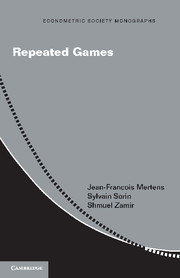Book contents
- Frontmatter
- Contents
- List of Figures
- Foreword
- Preface
- Acknowledgements
- Presentation of the Content
- Part A Background Material
- I Basic Results on Normal Form Games
- II Basic Results on Extensive Form Games
- III The Belief Space
- IV General Model of Repeated Games
- Part B The Central Results
- Part C Further Developments
- Appendix A Reminder about Analytic Sets
- Appendix B Historical Notes
- Appendix C Bibliography
- Appendix D Updates
- Author Index
- Subject Index
- Miscellaneous Endmatter
III - The Belief Space
Published online by Cambridge University Press: 05 February 2015
- Frontmatter
- Contents
- List of Figures
- Foreword
- Preface
- Acknowledgements
- Presentation of the Content
- Part A Background Material
- I Basic Results on Normal Form Games
- II Basic Results on Extensive Form Games
- III The Belief Space
- IV General Model of Repeated Games
- Part B The Central Results
- Part C Further Developments
- Appendix A Reminder about Analytic Sets
- Appendix B Historical Notes
- Appendix C Bibliography
- Appendix D Updates
- Author Index
- Subject Index
- Miscellaneous Endmatter
Summary
In this chapter we give a formal treatment to the basic concepts of models with incomplete information, namely, beliefs, types, consistency of beliefs, common knowledge, etc. Given a parameter space K, we first construct the Universal Belief Space Ω. A point ω in Ω, which we call a state of the world, consists of (in addition to the value of the parameters) the specification of the “state of mind” of each of the players (i.e., the probabilities generated by beliefs on K, beliefs on these beliefs, and so on). We study the mathematical structure and properties of Ω, introducing the notion of belief subspace, which is closely related to the concept of common knowledge. We next define the concept of consistent beliefs as beliefs that can be derived as conditional probabilities from some common prior distribution, given each player's private information. We characterize the consistent states of the world (i.e., states of the world in which the players' beliefs are consistent). An approximation theorem is then presented stating roughly that any incomplete information situation can be approximated by one in which there are finitely many potential types of each player. In the last section we discuss models and strategic equilibria of games with incomplete information, based on the structure of the beliefs space developed in this chapter.
THE UNIVERSAL BELIEF SPACE
When considering a situation involving a finite player set I facing some uncertainty about a space K (which we refer to as the space of states of nature), one is naturally led to handle infinite hierarchies of beliefs: adopting a Bayesian approach, each player will base his decision on some subjective beliefs (i.e., probability measure) on K. Since the outcome is determined not only by the player's own actions but the other players' actions as well, and those are influenced by their beliefs on K, each player must also have beliefs on other players' beliefs on K. By the same argument he must have beliefs on other players' beliefs on his own beliefs on K, beliefs on other players' beliefs on his beliefs on their beliefs on K, etc.
- Type
- Chapter
- Information
- Repeated Games , pp. 123 - 170Publisher: Cambridge University PressPrint publication year: 2015

